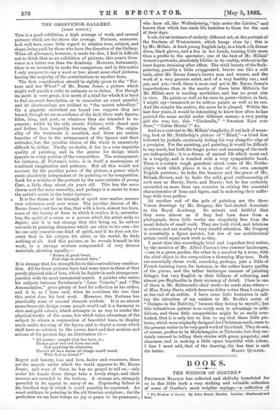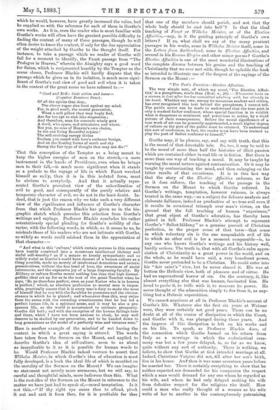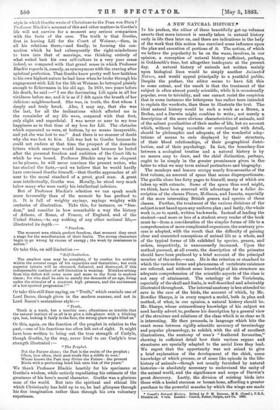BOOKS.
THE WISDOM OF GOETHE.*
PROFESSOR BLAME has collected and skilfully translated for us in this little book a very striking and valuable collection of some of Goethe's most weighty sayings,—a collection of
• The Wisdom of Goithe. By John Stuart Blackie. London: Blackwood and SOM.
which he would, however, have greatly increased the value, bad he supplied us with the reference for each of them in Goethe's own works. As it is, even the reader who is most familiar with Goethe's works will often have the greatest possible difficulty in finding the context of many of these passages, though he will often desire to know the context, if only for the due appreciation of the weight attached by Goethe to the thought itself. For instance, to take a passage which no reader of Goethe will fail for a moment to identify, the Faust passage from "The Prologue in Heaven," wherein the Almighty says a good word for Satan, which is reciprocated heartily by the Tempter as the scene closes, Professor Blackie will hardly dispute that the passage which he gives us in its isolation, is much more signi- ficant of Goethe's real view of good and evil when it is taken in the context of the great scene we have referred to :—
" Good and Fiji: their action and issue-
(loquitur Dominus Deus).
Of all the spirits that deny, The clever rogue sins least against my mind.
For, in good sooth, the mortal generation, When a soft pillow they may haply find, Are far too apt to sink into stagnation ; And therefore, man for comrade wisely gets A devil, who spars, and stimulates, and whets.
But you, ye some of Heaven's own choice, In the one living Beautiful rejoice !
The self-evolving energy divine
Euclasp you round with love's embrace benign, And on the floating forms of earth and sky Stamp the fair type of thought that may not die !"
That this conception of the Tempter as a being meant to keep the higher energies of men on the stretch,—a mere instrument in the hands of Providence, even when he brings men to their fall,—is much more significant when it stands as a prelude to the voyage of life in which Faust wrecked himself so sally, than it is in this isolated form, must be obvious to everybody. And that it actually repre- sented Goethe's prevalent view of the subordination of -evil to good, and consequently of the purely relative and temporary character of evil, we do not in the least doubt. In- deed, that is just the reason why we take such a very different view of the significance and influence of Goethe's character from that which Professor Blackie has given us in the bio- graphic sketch which precedes this selection from Goethe's writings and sayings. Professor Mackie concludes his rather ostentatiously special pleading for Goethe's nobility of cha- racter, with the following words, in which, as it seems to us, he misleads those of his readers who are not intimate with Goethe, as widely as words could mislead them in the appreciation of that character :—
"And what is this culture,' which certain persons in this country have hastily construed into a monstrous intellectual idolatry and sinful self-worship ? as if n nature so keenly_ sympathetic and so widely social as Goethe's could have dreamt of a human culture as a thing possible, made up merely of intellectual dexterities and artistic presentations, without the fine bond of love, the sweetness of social intercourse, and the expansive joy of a large dispensing faculty. By Bildung or culture Goethe meant nothing less than that high human- -godlike ideal set up for us in the text of the great Teacher when he says, 'Be ye therefore perfect, even as your Father who is in heaven is perfect;' which, as absolute perfection to mortal men is impos- sible, practically means that it is every man's duty to make the most 43f himself that he can with the faculties be possesses and the circum- stances in which he is placed ; and whosoever does this, may retire from the scene with the consoling consciousness that he has led a perfect human life, in a spiritual sense, and it may be also a pro- sperous life, as the world is accustomed to estimate prosperity. -Goethe did both ; and with the exception of the human failings here and there, which I have not been anxious to cloak, he may well deserve to be studied by our generation, and to be handed down to long generations as the model of a perfectly wise and virtuous man."
Here is another example of the mischief of not having the -context in which a great saying is uttered. The words here taken from the Sermon on the Mount, and applied to describe Goethe's idea of self-culture, seem to us about as inapplicable to it as it is possible for human words to be. Would Professor Blackie indeed venture to assert that Willi-elm Meister, in which Goethe's idea of education is most fully developed, is a book the ideal life of which is moulded on the morality of the Sermon on the Mount? We can imagine no statement not merely more erroneous, but we will say, to -careful and thoughtful minds, more ludicrous than this. What is the root-idea of the Sermon on the Mount in reference to the matter we have just bad, to speak of,—moral temptation. Is it not this,—" If thy right eye cause thee to offend, pluck it out and cast it from thee, for it is profitable for thee
that one of thy members should perish, and not that thy whole body should be cast into hell"? Is that the ideal teaching of Faust or Wilhelm Meister, or of the Elective .Affinities,—nny, is it the guiding principle of Goethe's own
letters If so, what shall we say of the many prurient passages in his works, some in Wilhelm Meister itself, some in the Letters from Switzerland, some in Elective Affinities, and several in his Boman Elegies and other minor poems ? Goethe's Elective Affinities is one of the most wonderful illustrations of the complete divorce between his genius and the teaching of Christianity that we ever met with, though he upholds the book as intended to illustrate one of the deepest of the sayings of the Sermon on the Mount :—
"The Poet's Function—Elective Affinities.
The very simple text, of which my novel, The Elective Affini- ties,' is a paraphrase, reads thus (Hatt. v., 28) i—Whosoever looks on a woman to lust after her has committed adultery with her already in his heart. Whether any one, among its numerous readers and critics, has ever recognised this text behind the paraphrase, I cannot tell. The public never can be made to understand that the true poet is only a masked father confessor, whose special function is to exhibit what is dangerous in sentiment and pernicious in action, by a vivid picture of their consequences. Before the moral significance of a true work of art can be generally apprehended, a much higher degree of culture on the part of the public must be attained. To understand this sort of confession, in fact, the reader must have been trained to play the part of father confessor to himself."
Goethe may, if he pleases, say, and say with truth, that this is the moral of that detestable tale. So, too, it may be said to be the moral of more than half the histories of illicit passion which are contained either in real life or in fiction. But there is more than one way of teaching a moral. It may be taught by warning the moral nature against contamination. Or it may be taught by contaminating the mind, and then enlarging on the bitter results of that experience. It is in this last way that the story of the Elective Affinities enforces, so far as it does enforce, the teaching of the passage in the Sermon on the Mount to which Goethe referred. In Goethe's writings, temptation, however ruinous, is always treated in the same way,—as a subject for delicate analysis and elaborate dalliance, indeed as productive of no true evil even if it results in occasional triumph over man's virtue, on the ground that the full teaching of human "experience," that great object of Goethe's adoration, has thereby been gained in full. Professor Blackie's attempt to represent Goethe's " Selbst-bildung " as a genuine pursuit of Christian perfection, in the proper sense of that term—that sense in which voluntary sin is the one unspeakable evil of life to which no other evil is for a moment comparable—is, to any one who knows Goethe's writings and his history well, hardly serious. The truth is, that with all Goethe's calm appre- ciation of Christianity as a great power in the world, and on the whole, as he would have said, a very beneficent power, Goethe never pretended to be a Christian. He could enter into his "fair saint's" view, but he never shared it. His was at bottom the Hellenic view, both of pleasure and of virtue. He had no supernatural horror of sin. On the contrary, it, like almost everything else that was human, fascinated him. He loved to probe it, to trifle with it, to measure its power. He never thought of the admonition simply to flee from it, as any- thing but a Hebraic superstition.
We cannot acquiesce at all in Professor Blackie's account of Goethe's life. Whatever else the first six years at Weimar were, they were certainly not good years. There can be no
doubt at all of the course of dissipation in which the Court, and Goethe with it, was plunged during those years. And the impress of this dissipation is left on his works and on his life. To speak, as Professor Blackie does, of the connection which Goethe formed on his return from Italy as a marriage in which the ecclesiastical cere- mony was but a few years delayed, is, so far as we know,
quite without any sort of authority. There is nothing, we believe, to show that Goethe at first intended marriage at all. Indeed, Christiane Vulpius did not, till after her son's birth, live in his house. And' then it was some seventeen years before he married her. There is certainly everything to show that he
neither expected nor demanded for his companion the respect which a man would demand for any one whom he regarded as his wife, and whom he had only delayed making his wife from defective respect for the religious rite itself. How could a man who really thought of a woman as his wife write of her to another in the contemptuously patronisiug style in which Goethe wrote of ChriAlane to the Frau von Stein ?
Professor Blackie's account of this and other matters in Goethe's life will not survive for a moment any serious comparison with the facts of the case. The truth is that Goethe, first in leaving Lili for the Court of Weimar,—then, in all his relations there,—and finally, in forming the con- nection which he had subsequently the right-mindedness to turn into that of marriage, was thinking entirely of what suited best his own self-culture in a very poor sense indeed, as compared with that grand sense in which Professor Blackie regards -it, namely, as synonymous with the craving after spiritual perfection. That Goethe knew pretty well how faithless to his own highest nature he had been when he broke through his engagement with Lili for the life at Weimar. he betrayed plainly
enough to Eckermann in his old age. In 1830, two years before his death, he said :—" I see the fascinating Lili again in all her vividness before me, and it is as if I felt again the breath of her
delicious neighbourhood. She was, in truth, the first whom I deeply and truly loved. Also, I may say, that she was the last, for all the inclinations which affected me in the remainder of my life were, conpared with that first, only slight and superficial. I was never so near to my true happiness as in that time of my love for Lili. The obstacles which separated us were, at bottom, by no means insuperable, and yet she was lost to me." And there is no manner of doubt why she was lost to him. Lili was lost to Goethe because he could not endure at that time the prospect of the domestic fetters which marriage would impose, and because he lusted after the personal freedom and ambition of the Court life to which he was bound. Professor Blackie may be as eloquent as he pleases, he will never convince the present writer, who has studied the facts,—and we believe that he would hardly have convinced Goethe himself,—that Goethe approaches at all
near to the moral standard of a great, good man. A great man intellectually, Goethe was. Morally, he stood very much below many who were vastly his intellectual inferiors.
But of Professor Blackie's selection we can speak much more favourably than of the memoir he has prefixed to it. It is full of weighty sayings, sayings weighty with centuries of illustration. Take this, for instance, on "free- dom," and consider in how remarkable a way the history of Athens, of Rome, of France, of England, and of the United States,—to say nothing of any other national life,— illustrated its depth :— "Freedom.
The moment men obtain perfect freedom, that moment they erect a stage for the manifestation of their faults. The strong characters begin to go wrong by excess of energy ; the weak by remissness in action."
Or take this, on self-limitation :— "Self.lintitation.
The smallest man may be complete, if he confine his activity within the natural range of his capacities and dexterities ; but even superior talents will be obscured, defeated, and destroyed, if this indispensable instinct of self-limitation is wanting. Mistakes arising from this defect will come more and more to the front in modern times ; for who shall be able to satisfy the demands of an age, living under the stimulus of a constant high pressure, and the excitement of a hot-spurred progression "
Or take this still finer saying, on "Truth," which reminds one of Lord Bacon, though given in the modern manner, and not in Lord Bacon's sententious style Truth.
Truth is a torch, but a terrible one; oftentimes so terrible that the natural instinct of us all is to give a side-glance with a blinking eye, lest, looking it fairly in the face, the strong glare might blind LIB."
Or this, again, on the function of the prophet in relation to the past,—one of his functions too often left out of sight. It might have been written to bring out the true strength of Carlyle, though Goethe, by the way, never lived to see Carlyle's true strength illustrated "The Prophet.
Not the Future alone ; the Past is the realm of the prophet ; Often, how often, their past reads like a riddle to men ! Whoso knows the Past may divine the Future : the present Binds with a perfecting bond link unto link of the years."
We thank • Professor Blackie heartily for his specimens or Goethe's wisdom, while entirely repudiating his estimate of the greatness of his hero's moral character. Goethe was a glorious man of the world. Bat into the spiritual and ethical life which Christianity has held up to us, he had glimpses through his fine imagination rather than through his own voluntary experience.




































 Previous page
Previous page